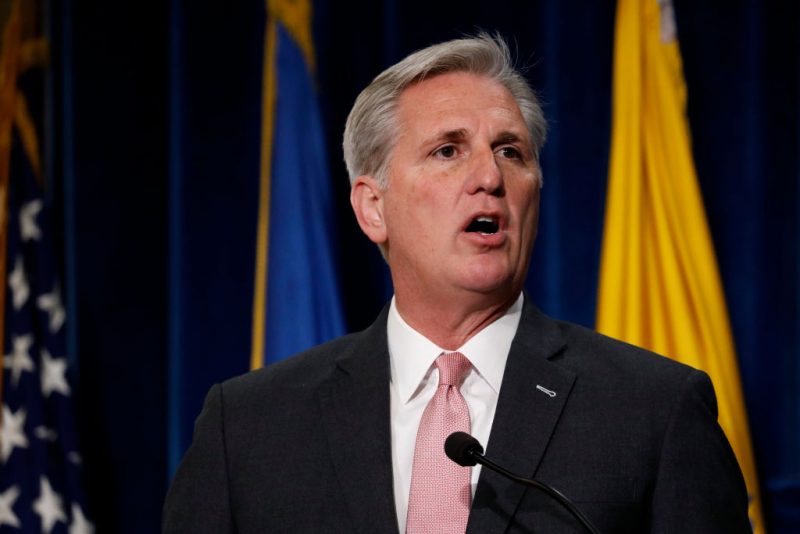
By Barry W. Poulson and David Biddulph
March 28, 2023
(Views expressed by guest commentators may not reflect the views of OAN or its affiliates.)
House Speaker Kevin McCarthy and his Republican colleagues refuse to negotiate an increase in the debt ceiling without a reduction in federal spending. They propose capping discretionary spending in fiscal 2024 at fiscal 2022 levels. This would require a reduction in discretionary spending of $133 billion. There is broad support within the Republican caucus that the spending cuts should be in non- defense programs. President Biden and his Democratic colleagues say that raising the debt ceiling automatically without negotiations over federal spending is “not negotiable”. For Democrats the idea that discretionary spending should be reduced significantly and that the spending cuts should only be in non-defense programs is a non-starter in the current budget negotiations. Who will win the Biden- McCarthy debt ceiling battle?
The fatal flaw in these budget negotiations is that there is no effective budget constraint. What Republicans and Democrats are really fighting over is not a budget, but rather a spending program. Congress is required by law to enact a budget resolution prior to approving expenditures, but Congress passes continuing resolutions that allow it to spend funds even in the absence of a budget resolution. Separate committees propose budgets for twelve different federal programs that is then the basis for negotiation over an Omnibus Bill, but there is no single legislative body responsible for the entire budget, and no effective constraint on the growth in federal spending.
Theoretically, the debt limit imposes a cap on the amount that Congress can borrow and spend. But Congress routinely increases the debt limit to accommodate the borrowing and spending that has already occurred, and they will likely do so in the current negotiations as well.
A budget constraint was imposed in the 2011 Budget Control act (BCA). BCA was the outcome of a compromise between Republicans and Democrats to increase the debt ceiling that year in exchange for spending constraints over the following decade. The debt ceiling was increased by $1.2 trillion, contingent on Congress reducing spending by an equal amount over the decade.
The BCA created the Joint Select Committee on Deficit Reduction charged with coming up with a plan to reduce deficits by at least $1.2 trillion over ten years. The Joint Committee failed to agree on spending reductions, but provided a fallback mechanism to reduce deficits, sequestration or across the board reductions in spending. The reductions in spending were to be achieved by imposing discretionary spending caps and automatic reductions in mandatory spending. The spending caps imposed by BCA were based on the ‘parity principle’ requiring equal reduction in defense and non- defense spending. Funds could be shifted between government programs, but BCA prohibited the reallocation of funds between defense and non-defense programs.
After a decade in which the BCA spending caps have been increased and circumvented to accommodate higher levels of spending it is not surprising that the spending caps were allowed to expire in 2022. In the FY 2023 Omnibus Bill, Congress also abandoned the ‘parity principle’. Total defense funding increased 9.7% compared to a 7.9% increase in non-defense funding. The bill also provided for $47 billion in supplemental funding for Ukraine and $38 billion for natural disaster and other expenditures. Total non-emergency funding increased 9% over the 2022 funding. More than 75% of the increased funding is for defense and less than 25% is for non-defense programs. With the expiration of BCA spending caps total federal spending is accelerating, and a greater share of the increased spending is allocated to national defense.
In the absence of a fiscal rule imposing a budget constraint, the most likely outcome of budget negotiations for fiscal year 2024 is business as usual. Republican legislators will compromise with their Democratic colleagues to sanction higher levels of spending. Since abandoning the ‘parity principle’, interest groups supporting higher defense spending have been more successful than the interest groups supporting non-defense spending, and that is likely to continue in the next fiscal year.
The Congressional Budget Office (CBO)projects that, under current law, debt will continue to increase and by midcentury will exceed 200 percent of national income. CBO also concludes that the increase in federal spending and debt under current law is not sustainable. Higher debt levels will be accompanied by sharp increases in interest rates further increasing the debt burden. Long before the debt burden grows to 200 percent of national income the nation will be exposed to a high risk of debt default.
To address this risk, House Budget Chairman Jodey Arrington (TX-19) recently introduced HCR 24, which would establish a constitutional path for the states to draft and the people to ratify an Inflation-fighting Fiscal Responsibility Amendment. The resolution, if approved by a simple majority vote in Congress, would set the date and place for a Convention for proposing Amendments and require a vote of the people in 3/4 of the states to approve any proposed amendments. The Federal Fiscal Sustainability Foundation is requesting that state attorneys general consider a mandamus case to force Congress to fulfill its duty, as described in HCR 24, and return the country to a sustainable fiscal path.
Barry W. Poulson and David Biddulph are Co-founders of the Federal Fiscal Sustainability Foundation

